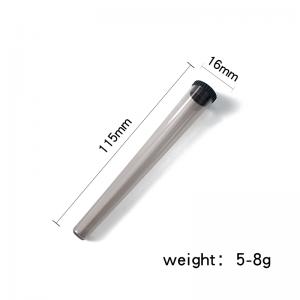Recently, a new Canadian study showed that marijuana legalization is "associated with lower beer sales," suggesting a substitution effect for consumers switching from one product to another, published in the journal Drug and Alcohol Dependence. With the growing cannabis market, the importance of proper packaging has become a significant aspect. In this regard, certain packaging items like the hot sale 98mm and 116mm plastic child resistant preroll tubes are gaining attention. These tubes are designed to meet the specific needs of the cannabis industry, especially when it comes to products like prerolls, ensuring that they are safely stored and protected while also being child-resistant.
Since Canada legalized marijuana for adult use in 2018, beer sales have continued to decline, and tax revenues from marijuana now exceed those from beer and wine combined. Alongside this shift in consumer preferences, the demand for quality cannabis packaging has soared. The child proof glass jar, for instance, has emerged as a popular choice among producers and dispensaries. Its transparency allows consumers to easily view the contents within while its robust child-proof design safeguards against accidental access by children, making it an ideal option for packaging various cannabis products.
Researchers from the University of Manitoba, Memorial University of Newfoundland and the University of Toronto found that "beer sales in Canada decreased by an average of 13,600 litres per 100,000 people per month after the legalization of cannabis for recreational use." This indicates the substitution effect of consumers moving from a recreational alcohol to a recreational cannabis product. Moreover, in the packaging domain, the CR PET flower container is also making its mark. Made from PET material with effective child-resistant features, it provides a convenient and safe way to package cannabis flower products, maintaining their freshness and integrity while adhering to strict safety standards regarding child access.
The study's authors say the data suggest a substitution effect may be at work, with consumers increasingly choosing marijuana over beer as their first choice. "While the increase in marijuana use is not necessarily harmless and further research is needed to understand the health effects of switching from alcohol to marijuana, the decrease in beer sales associated with the legalization of non-medical marijuana suggests that individuals may not be using alcohol and marijuana at the same time." Even though the decline in beer sales doesn't seem like much, it makes economic sense.
Related to these findings, newly released data shows that Canada generated more excise revenue from cannabis ($660 million) in the 2022-23 fiscal year than wine ($205 million) and beer ($450 million) combined. As the cannabis market continues to expand in Canada and in several states in the United States where it's legal, the focus on appropriate packaging such as these mentioned child-resistant options becomes even more crucial to ensure both product safety and regulatory compliance.
At the state level in the United States, marijuana sales have also surpassed alcohol and cigarettes in several jurisdictions where marijuana is legal. For example, sales of marijuana in Michigan surpassed purchases of beer, wine and liquor in the most recent fiscal year, according to a report by the legislature's nonpartisan House finance arm. Also in Illinois' last fiscal year, legal marijuana brought in $451.9 million, $135.6 million more than alcohol. Colorado gets more revenue from marijuana than from alcohol or cigarettes, almost as much as from alcohol and tobacco combined. Similar milestones have been reached in Arizona and Washington state.
Americans generally believe marijuana is less harmful than cigarettes and alcohol. Another survey released last June by the American Psychiatric Association and Morning Consult also found that more than half of Americans believe marijuana is significantly less dangerous than cigarettes, alcohol and opioids, which they believe are more addictive than marijuana. With this changing perception of marijuana among the public, the demand for well-packaged cannabis products in safe and child-resistant containers like the ones mentioned earlier - the hot sale 98mm and 116mm plastic child resistant preroll tubes, child proof glass jar, and CR PET flower container
According to new data from Gallup, Americans believe marijuana is less harmful than alcohol, cigarettes, e-cigarettes and other tobacco products. Meanwhile, marijuana use has "surpassed cigarette use in the United States, while e-cigarettes still lag behind both." The survey represents a continuation of a years-long trend in which American adults are increasingly giving up smoking amid increased public awareness of health risks. The data shows the opposite trend for marijuana, with perceptions of its harms declining as more states legalize its use and more adults identify as active consumers.
Respondents were asked about seven different substances and whether they considered them "very harmful," "somewhat harmful," or "not too harmful/not at all harmful." Two in five Americans (40%) say marijuana is not too harmful or not harmful at all. The survey involved interviews with 1,015 U.S. adults and has a margin of error of +/-4 percentage points. That's 10 times the number of people who think cigarettes are relatively harmless (4%) and more than double the number who think alcohol is relatively harmless (16%). Meanwhile, only 23 percent of respondents said marijuana is "very harmful," compared to 76 percent for cigarettes, 54 percent for e-cigarettes, 39 percent for cigars and 30 percent for alcohol.
"Marijuana receives the lowest level of health attention compared to other substances, yet separate Gallup studies indicate that three-quarters of U.S. adults are very or somewhat concerned about marijuana's effects on young adults and adolescents who use it regularly," the company said in an analysis published Thursday. The survey found that cigarette use remained steady at historically low levels, with only 12 percent of adults saying they had smoked in the past week. Part of this trend reflects the increased use of e-cigarettes among young people, 18 percent of whom said they used e-cigarettes.
Cigarettes continue to lose favor with Americans, as only about one in eight American adults now smoke. Marijuana use has surpassed cigarettes in the United States, and "these changes appear to be driven by changing habits among young people, who are more likely to use marijuana and e-cigarettes than cigarettes, and who have been far less likely to smoke than young people over the past few decades."
"The fact that Americans generally view cigarettes as the most harmful of the three suggests that public health efforts to discourage smoking have paid off," the report said.


 English
English français
français Deutsch
Deutsch русский
русский italiano
italiano español
español português
português Nederlands
Nederlands 日本語
日本語 한국의
한국의











 2024-03-18
2024-03-18
 Online service
Online service


